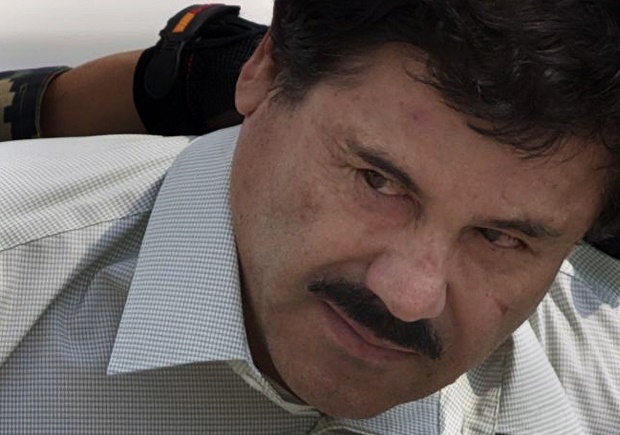Police recall chaotic night of ‘El Chapo’s’ escape

In this Feb. 22, 2014 file photo, Joaquin “El Chapo” Guzman is escorted to a helicopter in handcuffs by Mexican Navy marines at a navy hanger in Mexico City. The government has been offering a reward of 60 million pesos, or about $3.5 million dollars, for Guzman’s recapture after he made his second escape from a maximum security prison through an underground tunnel in 2015. AP File Photo
MEXICO CITY, Mexico—Mexican police officers remember Joaquin “El Chapo” Guzman’s prison breakout this way: a portly guard got stuck in the drug lord’s tight escape hole, while nobody knew who had to sound the alarm.
READ: Mexico seizes planes, homes in search for drug lord
Adding to the confusion, another notorious drug baron, Servando “La Tuta” Gomez, suddenly fell ill inside another cell—an unfortunate distraction shortly before Guzman snuck down a hole under his shower on the chaotic night of July 11.
According to prosecutors, the federal police officers assigned to the monitor control room of the Altiplano maximum-security prison in central Mexico helped Guzman escape.
READ: Mexico arrests suspected organizers of ‘El Chapo’ jailbreak
Article continues after this advertisementBut the dozen officers detained over the prison’s first-ever escape reject the charges.
Article continues after this advertisementThey do admit, however, that they lacked proper training and equipment such as radios equipped with a “code red” button to alert all security forces about an escape, according to copies of their statements to the authorities, obtained by AFP.
The Sinaloa drug cartel chief’s accomplices had blocked the entrance of his escape tunnel with a metal plate that was secured with a hydraulic jack. The officers used a lever to pry it open.
After three officers went through the narrow hole leading to the tunnel, a prison guard who tried to follow them “got stuck in it due to his physique,” one of the agents testified.
Roberto Cruz Bernal, whose job was to monitor surveillance camera footage, was the first one to enter, without a weapon, the 1.5-kilometer (one-mile) tunnel.
Bernal was arrested on charges of failing to follow protocols and preventing the activation of “code red,” a system that connects the radios of security forces, including the army, to stop an inmate from fleeing.
But in his statement to a judge, Bernal said he was not familiar with the manual of the nation’s penitentiary system, which contains the guide for activating “code red.”
Officials “gave it to me to read on August 17, 2015,” or more than a month after Guzman’s escape, Bernal said. His superiors asked him to sign the manual, but he refused as it was backdated to March 24.
“We learned (our jobs) based on the experiences of other colleagues,” the officer stated.
Who activated code red?
A spokesman for the National Security Commission said he could not say who activated “code red” that night, how long it took to turn it on, or who was responsible for doing so.
“There are internal work protocols for the prisons, but it’s not possible to make them public,” the spokesman said.
Surveillance camera footage showed that it took nearly 30 minutes for the first prison official to show up outside Guzman’s cell. Hammering could be heard shortly before the escape.
Sophisticated equipment to detect underground noises had stopped working 14 months earlier. The control room’s chief, Vicente Flores, had reported the problem but he is among those arrested.
The federal police officers are among some 30 people who have been detained over the escape, including the prison’s warden, guards and associates of Guzman who worked on the outside.
The federal agents were assigned to the monitor control room, while prison guards were in charge of securing the cells and activating “code red,” said Alberto de la Cruz, a defense lawyer representing the detained police.
“Code red was not activated by the (prison) personnel,” De la Cruz told AFP.
Sick drug lord
After Guzman escaped from his cell, three federal police officers went into the tunnel.
It took them an hour and a half to reach the exit at a half-built house, according to their statements. Guzman is believed to have made it in less than 30 minutes, thanks to a motorcycle mounted on rails.
Once they reached the other end, the officers said they gave the coordinates of the property. Prison director Valentin Cardenas, who is now under arrest, arrived there with security forces one hour and 20 minutes later, one of the officers said.
By then, more than three hours had passed since Guzman disappeared from his cell. It was just 17 months after Mexico’s most wanted man was arrested in the first place.
Three other agents assigned to the control room were having dinner at the cafeteria when Guzman escaped.
Police officer Jaime Galindo Hernandez said he was monitoring the cell of Servando Gomez, who collapsed 20 minutes before Guzman’s escape due to a severe stomach ache, disappearing from the screen. Guards had to take him to the infirmary urgently.
After exiting the tunnel, Guzman was driven 135 kilometers north to an airstrip, from where a small plane flew him to Sinaloa state, his northwestern bastion, authorities said.